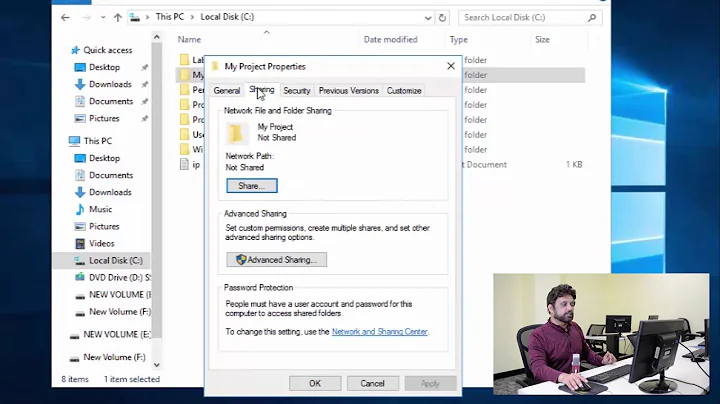set read and write permissions to folder and all its parent directories
Solution 1
This can be done easily in the shell, starting in the subdir and moving upwards:
f=/root/subfolder1/subfolder2/subfolderN
while [[ $f != / ]]; do chmod +rx "$f"; f=$(dirname "$f"); done;
This starts with whatever file/directory you set f too, and works on every parent directory, until it encounters "/" (or whatever you set the string in the condition of the loop to). It does not chmod "/". Make sure both f and the directory in the condition of the loop are absolute paths.
Solution 2
With csh, tcsh, ksh, zsh, bash, fish or yash -o braceexpand:
sudo chmod +rx /root{,/subfolder1{,/subfolder2{,/subfolderN}}}
With zsh:
f=/root/subfolder1/subfolder2/subfolderN
until [[ $f = / ]] {chmod +rx $f; f=$f:h;}
Or you could define a glob qualifier function like:
explode() {
reply=()
until [[ $REPLY = [./] ]] {
reply+=$REPLY
REPLY=$REPLY:h
}
}
To be used for instance as:
$ echo chmod +rx subfolder1/subfolder2/subfolderN(+explode)
chmod +rx subfolder1 subfolder1/subfolder2 subfolder1/subfolder2/subfolderN
Note that chmod +rx is affected by the umask. If your umask doesn't include 007, it would make the /root directory world-readable and accessible which is a bad idea. /root is typically for the super-user's private things, it's a bad idea to expose it.
Solution 3
I don't know what you are trying to do, but is better than you don't take the recursive lightly. That said, read the actual answer:
Umm... why not just use recursive.
sudo chmod -R +rx /root
Or if you don't like it, you can give chmod several directories:
sudo chamod +rx /root /root/subfolder1 /root/subfolder1/subfolder2 /root/subfolder1/subfolder2/subfolderN
Solution 4
Well, you could do something slightly more complex like:
echo "/root/subfolder1/subfolder2/subfolderN" |
perl -anF'/' -e 'while($#F>0){@b=join("/",@F);`chmod +rx @b`; pop @F}'
To see what this will do, replace the chmod call with print:
$ echo "/root/subfolder1/subfolder2/subfolderN" |
perl -alnF'/' -e 'while($#F>0){@b=join("/",@F);print "chmod +rx @b"; pop @F}'
chmod +rx /root/subfolder1/subfolder2/subfolderN
chmod +rx /root/subfolder1/subfolder2
chmod +rx /root/subfolder1
chmod +rx /root
Related videos on Youtube
Maxim Yefremov
Updated on September 18, 2022Comments
-
Maxim Yefremov over 1 year
I need to set read and write permissions for
rootuser to directorysubfolderNand all its parent folders tillroot.I can do it by hands:
$ sudo chmod +rx /root/subfolder1/subfolder2/subfolderN $ sudo chmod +rx /root/subfolder1/subfolder2 $ sudo chmod +rx /root/subfolder1 $ sudo chmod +rx /rootBut if
Nis big I am tired. How to do automatically by one command?-
 Stéphane Chazelas almost 6 yearsYou should really not make
Stéphane Chazelas almost 6 yearsYou should really not make/rootworld readable.
-
-
 terdon over 10 yearsNice, I knew I was complicating things needlessly with Perl.
terdon over 10 yearsNice, I knew I was complicating things needlessly with Perl. -
 200_success over 10 yearsThat's not nearly the same operation, though.
200_success over 10 yearsThat's not nearly the same operation, though.chmod -R /rootchanges everything under/root— including regular files and all directories. The question is about changing one chain of directories only. -
Ludwig Schulze over 10 years@200_success but that's not the only answer ;)
-
 terdon over 10 yearsCould you explain what the leading
terdon over 10 yearsCould you explain what the leading,in{,/subfolder}does? -
 tripleee almost 6 yearsIt creates an alternation where the first string is empty and the second is
tripleee almost 6 yearsIt creates an alternation where the first string is empty and the second is/subfolder; so/root{,/subfolder}produces/rootand/root/subfolder -
 tripleee almost 6 yearsNotably this is not portable to POSIX
tripleee almost 6 yearsNotably this is not portable to POSIXsh -
 Tim almost 6 yearsBut what if
Tim almost 6 yearsBut what iffis a relative path, and I want to stop at what it is relative to instead of/? -
 Tim almost 6 years@StéphaneChazelas Thanks. If
Tim almost 6 years@StéphaneChazelas Thanks. If$fisfoo/bar, will$fever change to.? Yesdirnamedoes it. Thanks -
jmc over 5 yearsThe question is not about recursion, but how to set permissions on a chain of parent folders to allow selective access to a subfolder. Saying that it's not the only answer is like saying driving a bus through your wall is another way to make a door.
-
Felipe Rodriguez about 5 years@Tim convert relative path to absolute path before storing in f using command "f=`readlink -f <relative_path>`"
-
user3282611 about 4 yearsRemember to use absolute path. I used short link path and had a lot problems. Finally get it back to normal.
-
 Admin about 2 yearsI had to remove the quotation marks to make it work for my case:
Admin about 2 yearsI had to remove the quotation marks to make it work for my case:f=/root/subfolder1/subfolder2/subfolderN; while [[ $f != / ]]; do chmod +x $f; f=$(dirname $f); done;




